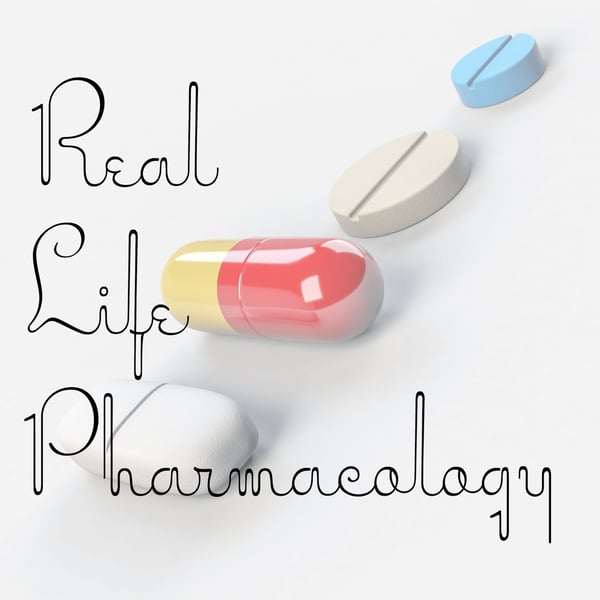Codeine Pharmacology
Real Life Pharmacology - Pharmacology Education for Health Care Professionals
Eric Christianson, PharmD; Pharmacology Expert and Clinical Pharmacist
5 • 716 Ratings
🗓️ 18 June 2020
⏱️ 15 minutes
🧾️ Download transcript
Summary
Codeine is metabolized by CYP2D6 to the active metabolite morphine. I discuss how this can be affected by genetics as well as other medications.
Constipation is a problem with codeine and all opioids in general. Education and making a plan with patients to combat this side effect is important.
Codeine is less potent than other opioids such as fentanyl, hydromorphone, and hydrocodone.
Transcript
Click on a timestamp to play from that location
| 0:00.0 | Hey all, welcome back to the Real Life Pharmacology podcast. I hope you're enjoying it so far. |
| 0:06.1 | If it's your first episode, you're listening, thank you so much. And hopefully you can find some |
| 0:12.7 | clinical practice pearls that are relevant to your practice or maybe help you in your board exam |
| 0:18.5 | or pharmacology exam if you're still in school. |
| 0:22.6 | So today the drug of the day is coding. |
| 0:27.3 | And with this medication, I will say that I've practiced pharmacy for over 10 years now, |
| 0:36.5 | been in various settings, long-term care consulting, |
| 0:41.1 | ambulatory care right in a clinic, in a retail community pharmacy. |
| 0:45.8 | And the use of this drug has definitely declined over time. |
| 0:51.2 | And I'm going to give you some examples as to what makes coding so special and so |
| 0:57.9 | unique as we go through the podcast here. So mechanistically, I think the important thing to remember, |
| 1:06.9 | coding is an opioid. So like many of the other opioids, like hydrocodone, for example, that I've |
| 1:13.2 | covered, it binds the CNS opioid receptors and ultimately stimulates them. This reduces that |
| 1:22.0 | perception of pain. That's ultimately what opioids do in the central nervous system. They don't act at the |
| 1:31.1 | site of action. So if you've got pain in your finger, it doesn't help with inflammation or |
| 1:38.3 | anything like that. It basically blunts the signals that are being sent to the brain and that perception of |
| 1:48.1 | those signals is essentially how opioids work. Brand names, Tylenol number three is the one that I recall |
| 2:00.0 | most vividly from my memory. |
| 2:03.1 | And I would say I don't see it very often anymore. |
| 2:07.4 | And again, like I said, it's to some of the complicated things. |
| 2:10.6 | But when I first graduated and was going through internships, things of that nature, |
| 2:17.5 | in the 2000s, late 2000s, I definitely saw a fair amount of Tylenol number three. |
... |
Transcript will be available on the free plan in -1747 days. Upgrade to see the full transcript now.
Disclaimer: The podcast and artwork embedded on this page are from Eric Christianson, PharmD; Pharmacology Expert and Clinical Pharmacist, and are the property of its owner and not affiliated with or endorsed by Tapesearch.
Generated transcripts are the property of Eric Christianson, PharmD; Pharmacology Expert and Clinical Pharmacist and are distributed freely under the Fair Use doctrine. Transcripts generated by Tapesearch are not guaranteed to be accurate.
Copyright © Tapesearch 2025.

